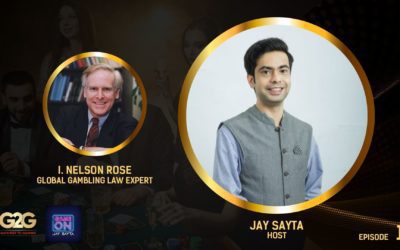Gambling and the Law®:
End Game for Daily Fantasy Sports?
Daily Fantasy Sports is Rocky Balboa.
Like Rocky in the big fight scene in Rocky I, DFS operators have been on the ropes since the beginning of October. But, also like Rocky, they continue to battle on, taking a beating that would floor any lesser competitor.
For example, during one week in September, “DraftKings was the single biggest advertiser on television.”[1] DFS operators have slowed their spending, in part because media companies are reluctant to run commercials for what might be illegal gambling. Still, DraftKings, FanDuel and their smaller competitors continue to spend enough to “move the needle” on the total amount spent by all advertisers for all products and services throughout the entire United States.[2]
Much of DFS operators’ bruises have been self-inflicted. DFS sites are staffed by people who like to play fantasy sports. This is true of every gaming operation that puts an existing game to the Internet. But DFS operators should have learned the lesson of Absolute Poker, where an insider was discovered to be a “super-user,” with the ability to see every other players’ down-cards.
[Add discussion of Absolute not being destroyed by bad press]DraftKings and FanDuel say they had already taken the obvious first step of banning their employees from participating in DFS on their own sites. We have to hope and assume this also covers not passing on inside information to family and friends.
But, given the nature of fantasy sports, which relies so heavily on statistical information, operators should have also prohibited their staffs from playing on every DFS site, especially big money games. This would have prevented the scandal that will haunt operators for years, where a DraftKings employee won $350,000 on FanDuel.
“Just a mistake,” said DraftKings about its manager, who accidentally released important customer information about player selections and then won $350,000 playing fantasy football at FanDuel. To state and federal prosecutors and disgruntled losing patrons, it looks instead like the manager used inside information to give himself an advantage in choosing which players to put on his fantasy team.
Now, prosecutors are looking into what other possible misconduct might have occurred. Worse, they are investigating whether DSF has violated state or federal anti-gambling statutes.
At least one class action has been filed. I expect both government and private lawyers to look for more than just money. They will attempt to get courts to issue injunctions, closing down the sites.
[Add discussion of declaratory judgments and injunctions, can’t enjoin a crime but can a nuisance. Here maybe allowing kids to participate. Plus violates states public policy of some states.]The timing of the $350,000 DraftKings scandal could not have been worse. The Attorneys General of New York and Massachusetts, and apparently of at least three other states, were already investigating whether DFS violated any of their state laws. The scandal broke at the beginning of October. On Monday, October 5th, the New York Times ran a lead editorial entitled, “Rein In Online Fantasy Sports Gambling.”[3] It also published a detailed, scathing investigative piece, with the not too subtle headline, “Cash Drops and Keystrokes: The Dark Reality of Sports Betting and Daily Fantasy Games.”[4]
Within three weeks bills were entered in Congress and state legislatures to outlaw DFS, at least one federal grand jury was convened, state attorneys general opened their own investigations and the FBI was called in.
A manager of a multi-billion-dollar mutual fund cancelled a call he had scheduled with me to discuss investing in DSF. Big investors may want big profits. But they are scared to death of uncertainty.
Even some of DSF’s allies were backing off. ESPN suspended branded segments featuring DraftKings during its news and information programs. The worry is more than mere public relations. If DSF is illegal gambling – which is by no means clear – then anyone associated with it could be facing serious federal and state criminal charges. Fighting potential sentences of years in prison and the confiscation of all profits arising from supposedly criminal activities would cost millions of dollars, even if the charges are eventually dropped.
The problem for DSF sites and their associates is not the minor scandal of possible insider trading, or even allegations of cheating. The problem is that violations of gambling laws trigger all of the draconian statutes designed to fight organized crime.
When Prohibition was repealed, organized crime, or OC as they call themselves, looked around for other illegal products and services that they could supply consumers. When you think of OC you naturally think of illegal drugs, prostitution and gambling. So both state legislatures and Congress passed numerous acts that make anyone involved with illegal gambling potentially liable under the anti-racketeering laws. These laws were expressly designed to include investors and others involved with OC who like to keep their hands clean.
There are three ways a non-actor, like ESPN, could be criminally liable merely for running ads for a business that violates anti-gambling laws.
The crime that is often called “the prosecutors’ friend” is conspiracy. Almost all state anti-gambling crimes are mere misdemeanors. But conspiracy to commit a misdemeanor is a felony. Prosecutors only have to prove is that there was an agreement to do an act that violates the law and that one of the co-conspirators took a substantial step toward completing that act. Co-conspirators do not even have to know that what they are agreeing to do is illegal.
The second and even more common way for a non-actor to be criminally liable for the actions of another person is accomplice liability. Unlike conspiracy, which is a separate crime, accomplice liability is a theory of liability. Often called aiding and abetting, this is a way to make anyone who helps another commit a crime become guilty of that crime. The get-away driver is guilty of bank robbery, even though he never steps foot into the bank.
For DFS, the last and possibly most frightening way for a person to be criminally responsible for the actions of another are special statutes. In the case of gambling, the most important is the federal Illegal Gambling Businesses Act.[5] Congress enacted the IGBA as part of the Organized Crime Control Act. It makes everyone who participates in a business that violates a state anti-gambling law guilty of a major federal felony. The only requirement is that the business has five or more people and does at least $2,000 in business a day.
According to DFS operators, Arizona, Iowa, Louisiana, Montana and Washington have expressly made fantasy sports illegal. So, DFS operators say they do not take players from those states, and now from Nevada as well, because they believe that doing so would be a violation of the IGBA.
Of course, there a dozen other states with anti-bookmaking and other laws on the books which might also apply to DFS.
[Other federal anti-gambling laws, particularly Wire Act. PASPA and UIGEA have minor roles].It is possible for an individual to be guilty of multiple crimes under these doctrines. For example, if someone agrees to help an illegal gambling business that has not just five but six other people involved, he can be charged with both conspiracy and the IGBA. And the IGBA opens the door to even worse anti-OC statutes, including RICO, Racketeer Influenced and Corrupt Organizations.[6] RICO allows federal prosecutors to seize all of a defendant’s assets that were derived from OC activities – the so-called “tainted fruit of the poisonous tree.” Plus, of course, potential penalties include many years in prison.
Everyone wants to know what is going to happen with DSF. Given this list of horrors, it may be surprising to hear that I am rather optimistic about the operators. The most important reason is money – big money coming from very powerful institutions.
Researchers at Princeton and Northwestern universities recently proved what every student of American politics already knew: Big money buys political influence. The professors examined 1,800 separate public policy debates between 1981 and 2002 and compared the preferences of average citizens with those of the wealthiest individuals and and largest special interests groups. The results: There was virtually no correlation between what the vast majority of Americans wanted and the actual laws that were enacted; but affluent citizens and powerful special interest groups were able to get legislatures to pass or defeat bills reflecting their positions.[7]
Of course, we don’t need to have studies to show how laws are made, or not made. The National Rifle Association was able to prevent Congress from passing a single new gun control law, even those supported by a majority of gun-owners, after the massacre of 20 students and six adults at Sandy Hook Elementary School in 2012. If the mass murder of first-graders does not result in such widely desired laws as background checks for gun purchasers, it is difficult to see how average Americans could ever defeat the lobbying power of politically well-connected special interest groups.
The proponents of DFS include the extremely rich and powerful sports leagues, with the sole exception of the NCAA. Even the fanatically anti-gambling NFL allows its team-owners to be directly involved with DFS operators.
Closely aligned with the professional sports teams are large mass media companies, like Disney. It is easy to see why: DFS players watch athletic events to the end, even when it is a blow-out. Unlike regular sports fans, DFS participants are more interested in the performance of their individual players than whether their team wins or loses, or even whether it beats the spread.
The main opponents of DFS are established legal gambling operators, particularly casinos. Nevada announced that it is taking up the battle against DFS by declaring DFS to be a form of gambling. DFS operators are taking the position that their games are contests of skill, so they could not apply for gaming licenses. Instead, they had to start excluding real-money players from the Silver State.
But casino owners have much bigger things to worry about than DFS, including the lack of interest in casino gaming by Millennials. And privately owned casinos do not have a good record when it comes to keeping out newcomers. Nevada’s casinos were against both Indian gaming and Internet poker; battles which they lost badly.
The other main opponents of DFS are the “anti’s”, mostly religious groups opposed to all legal gambling. The anti’s lost that battle decades ago.
So, the proponents of DFS have the power to get laws passed, expressly making their activities legal. But legislation will not immediately solve their problems.
[First step, set up a strong self-regulatory body. Good for p.r. Plus will give guidance on what regulations should be put into place by governments. And will help get favorable legislation passed. Also asked to be taxed, so state government becomes an ally rather than an enemy.]A federal law could be enacted preempting state anti-gambling laws, as was done with trading in stocks and commodities. But Congress no longer passes laws. And even if it did, there would have to be provisions for states to opt in or opt out. The federal government is not going to impose the same public policy on Nevada and Utah.
So the DFS operators are stuck with lobbying state by state. They could probably get a bill passed through the New York Legislature, making their operations legal in that state. But even if licensed in New York, a DFS site could not safely take players from New Jersey unless they got a similar statute passed their, or they convince the New Jersey Supreme Court that DFS was not gambling.
The reason I am optimistic is that DFS, and especially its allies in the professional sports organizations and mass media companies, have the resources to fight these battles throughout the entire nation. They do not even have to win; they only have to continue standing until they reach settlements with prosecutors and other opponents.
What will those settlements look like? There is little dispute that season-long fantasy sports is a contest of skill. DFS has eliminated at least one of the elements of skill: the ability of participants to make trades. The impact of chance is also much greater on daily games. For example, injuries and other unforeseen events happen all the time. But over the course of an entire season, such chance occurrences have much less of an impact on which fantasy teams win or lose.
I would suggest agreeing to legislation requiring that fantasy games must be based on real-world sports events taking place over at least two days. This would lessen the impact of random injuries and bring back the skill factor of allowing fantasy team owners to make trades.
In the end, will DFS win? Rocky Balboa withstood repeated blows that would have killed a lesser fighter, and stayed on his feet through all 15 rounds. Still, in the end of the first movie, he lost the match by a split decision. DFS and its many fans have to hope that Rocky I will not be an omen for them.
And they may be right. DFS may be getting hit almost every day. But it has not, and will not, throw in the towel. We are still in the early rounds. And this is only Rocky I.
Let’s not forget that in Rocky II, Rocky wins, and becomes the Heavyweight Champion of the World.
END
© Copyright 2015. Professor I Nelson Rose is recognized as one of the world’s leading authorities on gambling law and is a consultant and expert witness for governments and industry. His latest books, Gaming Law in a Nutshell, Internet Gaming Law and Gaming Law: Cases and Materials, are available through his website, www.GamblingAndTheLaw.com.
[1] Steven Perlberg, “Are DraftKings and FanDuel Bombarding Fans With Too Many Ads?” Wall Street J., https://blogs.wsj.com/cmo/2015/09/16/are-draftkings-and-fanduel-bombarding-fans-with-too-many-ads/ (Sept. 16, 2015).
[2] Myles Udland, “Fantasy sports companies spend so much on commercials they’re moving the needle on TV ad spending,” Business Insider, www.businessinsider.com/draftkings-fanduel-daily-fantasy-sports-advertising-2015-10 (Oct. 6, 2015).
[3] https://www.nytimes.com/2015/10/05/opinion/rein-in-online-fantasy-sports-gambling.html
[4] Walt Bogdanich, James Glanz and Agustin Armendariz, “Cash Drops and Keystrokes: The Dark Reality of Sports Betting and Daily Fantasy Games,” NY Times, https://www.nytimes.com/interactive/2015/10/15/us/sports-betting-daily-fantasy-games-fanduel-draftkings.html?_r=0 (Oct. 15, 2015).
[5] I8 U.S.C. § 1955.
[6] I8 U.S.C. § 1961 et seq.
[7] Martin Gilens and Benjamin I. Page, “Testing Theories of American Politics: Elites, Interest Groups, and Average Citizens,” in Perspectives on Politics (2014), https://journals.cambridge.org/download.php?file=%2FPPS%2FPPS12_03%2FS1537592714001595a.pdf&code=78d96083c8c6c20450aadfcbedad50cd.





0 Comments
Trackbacks/Pingbacks